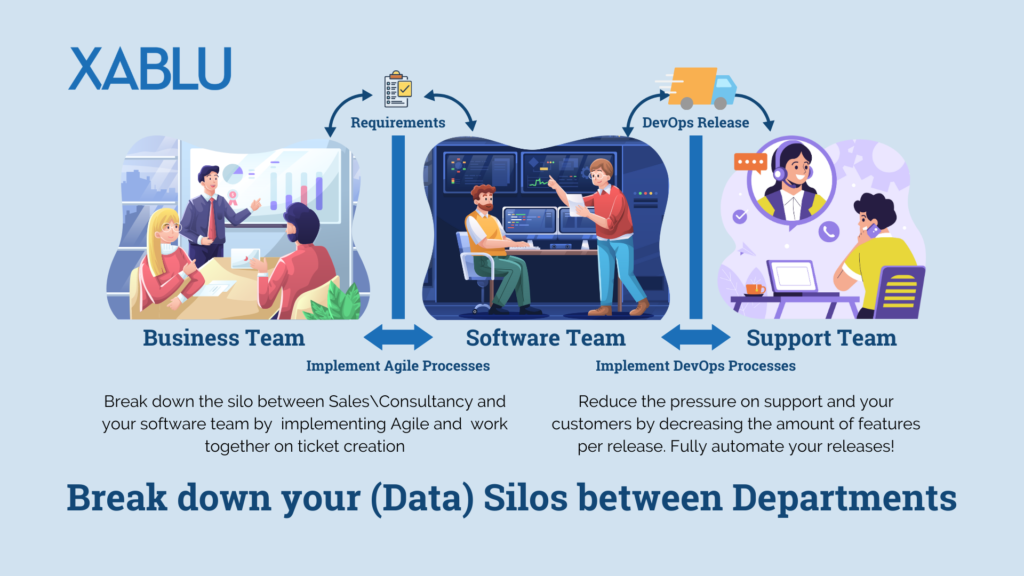
In today’s rapidly changing business environment, organizations should increasingly recognize the importance of cross-functional collaboration and seamless integration between departments. The silo mentality, where each department operates in isolation, can negatively impact an organization’s ability to respond to market changes, customer needs and new opportunities in their software development approach. To overcome this challenge, companies should turn to Agile Cooperation and Intelligent DevOps to break down silos and foster a culture of collaboration, agility and innovation. By implementing these approaches, organizations can streamline processes, improve communication, and increase their ability to deliver high-quality software in a timely and cost-effective manner.

In a software development company, it is common to see silos between departments such as sales, consultants, software development, and support. These silos can hinder communication, collaboration, and result in a lack of understanding of each department’s objectives and priorities.
For a software development company to be successful, it is essential to break down these silos and foster a culture of collaboration and cooperation. This will result in a better flow of information and a more integrated approach to problem-solving, leading to improved project outcomes and increased customer satisfaction.
Implementing Agile Cooperation and Intelligent DevOps can be a solution to break down the silos between your sales, consultantcy, software development, and support teams. By utilizing these methodologies, you will increase collaboration and communication, align department goals with company objectives, and ultimately drive success.
Understanding Silos in Software Companies
In software development companies, silos refer to the lack of communication and collaboration between the software team(s) and the sales, support and\or consultancy teams. These silos often form due to misunderstanding, lack of knowledge of the current topics a team is working on, or the absence of a unified company culture. The common causes of silos in software development companies include poor communication systems, lack of cross-team collaboration opportunities, and siloed incentives that drive departments to work in isolation.
This silo mentality can have a major impact on the productivity and innovation of the company. Teams that operate in silos are less likely to share knowledge and ideas, which can lead to duplicated efforts, inefficiencies, and slower problem-solving. Furthermore, silos can create a competitive atmosphere between departments, causing tension and slowing down the company’s overall progress. The inability to effectively collaborate also limits the potential for breakthrough ideas and solutions, hindering a company’s ability to stay ahead of the competition and drive growth.
Agile Cooperation: A Key Approach to Breaking Down Silos
Agile Cooperation is a key approach that can help break down these silos and create a more collaborative and efficient work environment. Agile Cooperation is an approach that emphasizes teamwork and collaboration, as well as continuous improvement and adaptability.
The key principles of Agile Cooperation include continuous feedback and improvement, cross-functional collaboration, and a focus on delivering value to the customer. In a software development company, these principles can be applied to a variety of teams, including sales, consultancy, software development, and support. For example, the sales team and the software development team can work together to better understand the needs of the customer and to ensure that the software being developed is aligned with their needs. The consultancy team can work with the support team to provide ongoing training and support to ensure that the software is being used effectively.
By embracing Agile Cooperation, software development companies can break down the silos that can prevent teams from working together effectively. By fostering a culture of collaboration and continuous improvement, companies can increase their productivity, improve their ability to innovate, and deliver better value to their customers.
Intelligent DevOps: Automating Collaboration for Better Results
Intelligent DevOps is a modern approach to software development and delivery that emphasizes collaboration, automation, and integration. This methodology aims to improve the speed, quality, and efficiency of software development by breaking down silos between different teams and departments. In a software development company, the integration of Intelligent DevOps can bring significant benefits to the cooperation between development teams, consultants, and support, as well as to the customer experience.
Key benefits of Intelligent DevOps for software development companies include less stress in the team prior to a release, higher quality software, improved collaboration between teams, and greater transparency and control over the development process. By automating collaboration, Intelligent DevOps also helps to reduce errors and improve consistency and speed in software development.
To implement Intelligent DevOps in a software development company, it is important to adopt best practices such as continuous integration, continuous delivery, and continuous testing. This involves setting up an automated pipeline for software development, testing, and delivery, which can help to ensure that software is delivered faster and with higher quality. By automating collaboration, Intelligent DevOps also helps to reduce the risk of misunderstandings between teams, improve the speed of decision-making, and promote a more efficient and productive work environment.
Please share your thoughts 😃
Curious how Xablu can help your organization ?